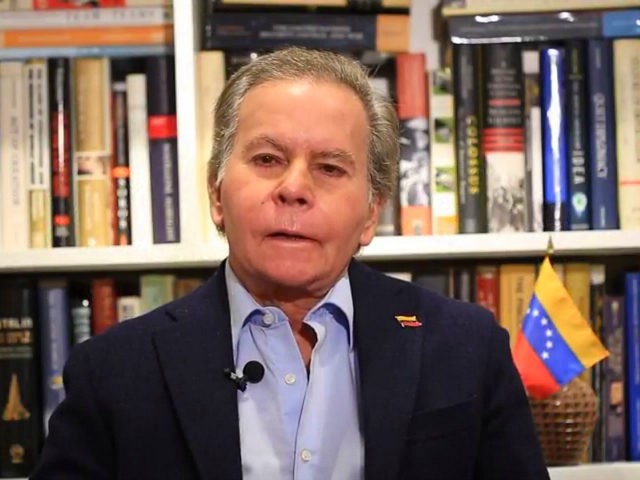Diego Arria, once Venezuela’s ambassador to the United Nations and a former UN Security Council president, returned to the global organization Monday to condemn the “unprecedented” situation his nation is experiencing, under a tyranny he defined as run by “drug traffickers and criminals.”
Arria addressed the UN’s Human Rights Council, which recently published a report finding extreme human rights violations against anti-socialist protesters in the country, most executed by the state’s Bolivarian National Guard. In his remarks, he urged the UN to follow the lead of the Organization of American States (OEA), which has repeatedly condemned Venezuela’s socialist regime, and take its leaders before the International Criminal Court (ICC).
“It is fundamental to have a democratic Venezuela that respects human rights,” he told the council. “The use of torture, sex crimes, and systematic murder of unarmed civilians who protest in the streets amount to crimes against humanity as defined by the Rome Statute.”
The UN Human Rights Council published a report this month confirming these accusations, detailing “credible and consistent accounts of victims and witnesses” that show “security forces systematically used excessive force to deter demonstrations, crush dissent and instill fear.” Among the crimes listed are “the use of electric shocks, severe beatings, stress positions, suffocation, and threats of sexual violence and death, and intended to punish, humiliate and terrorize the detainees, as well as to extract confessions and information about alleged anti-government activities.”
In his full comments, Arria targeted the highest levels of Venezuelan government, arguing that those running the country were not merely political criminals but drug traffickers and hatemongers on par with the propagandists urging genocide against Tutsis in the 1994 Rwandan genocide.
“More than 15 members of the armed forces who were once Venezuela—and today serve the regime, under the tutelage of Havana—are on the United States Treasury Department list of drug kingpins for drug and arms trafficking and money laundering,” he told the council. He noted that dictator Nicolás Maduro himself is personally sanctioned by the U.S. Treasury and singled out Diosdado Cabello, the head of the United Socialist Party of Venezuela (PSUV) and member of Maduro’s alternative socialist legislature, as especially capable of harm.
In addition to running Maduro’s party and helping draft a new, Maduro-friendly constitution, Maduro hosts a television program on the state network, Con el mazo dando (“Hitting with the Mallet”). “Cabello,” Arria argued, “is the most dangerous hatemonger and promoter of violence using state television and intelligence services, just as the Hutus did in Rwanda with Radio Milles Collines.”
Maduro, like many in the regime, stands accused of running a major international cocaine trafficking operation.
Arria noted that men like Pablo Escobar, the Colombian drug lord Cabello has been compared to, and Joaquín “El Chapo” Guzmán of the Mexican Sinaloa cartel never amassed political power in their countries. “El Chapo … was never president or vice president of Mexico, or head of the Supreme Court of Justice, or minister of defense, but his Venezuelan Nicolás Maduro, [vice president] Tarek El Aissami, [Supreme Court Chief Justice] Maikel Moreno, Diosdado Cabello and generals Vladimir Padrino y Néstor Reverol do occupy those positions in my country,” he lamented.
“It is an unprecedented situation,” he continued. “Narcos and criminals with full control of a country, with the complacency of corrupt generals and traitors to the nation who, sitting on the world’s most important oil reserves, represent a serious threat to regional peace and stability.”
While the Human Rights Council has taken interest in the dire situation in Venezuela—despite Maduro’s government holding a seat on the council—the UN body that has the most power to act, the Security Council, has dismissed the argument that Venezuela has destabilized the region. “Until now I think of course there is some concern, but at the end of the day we see [the Venezuelan crisis] as internal affairs,” Egyptian Ambassador Amr Abdellatif Aboulatta, who chaired the Security Council in August, said at the time. “It does not harm peace and security right now from my point of view.”
Banned from the United States by sanctions, Maduro himself is skipping next week’s General Assembly meeting and will also not participate in a Human Rights Council meeting in Geneva. Government spokesmen said Maduro was too “busy” to do so, despite having made the time to visit the Organization of Islamic Cooperation summit in Kazakhstan last week.

COMMENTS
Please let us know if you're having issues with commenting.